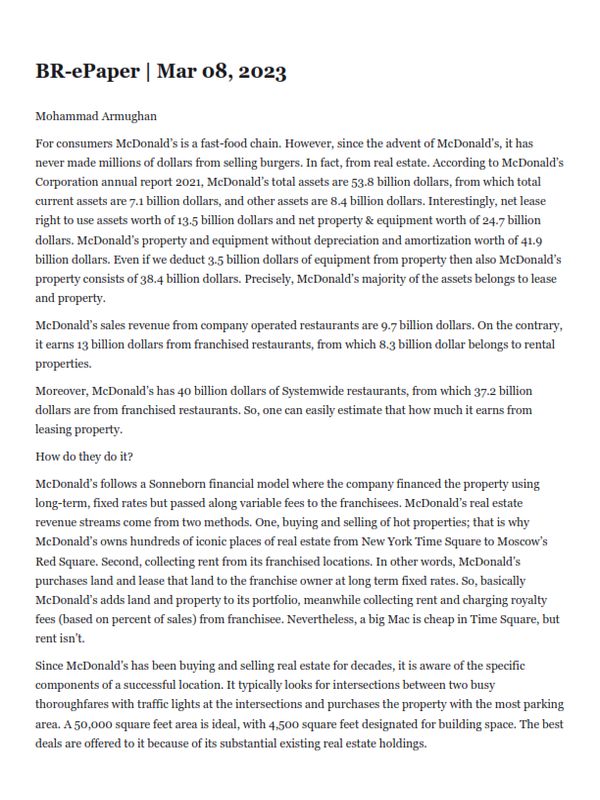How McDonald’s makes money
For consumers McDonald’s is a fast-food chain. However, since the advent of McDonald’s, it has never made millions of dollars from selling burgers. In fact, from real estate. According to McDonald’s Corporation annual report 2021, McDonald’s total assets are 53.8 billion dollars, from which total current assets are 7.1 billion dollars, and other assets are 8.4 billion dollars. Interestingly, net lease right to use assets worth of 13.5 billion dollars and net property & equipment worth of 24.7 billion dollars. McDonald’s property and equipment without depreciation and amortization worth of 41.9 billion dollars. Even if we deduct 3.5 billion dollars of equipment from property then also McDonald’s property consists of 38.4 billion dollars. Precisely, McDonald’s majority of the assets belongs to lease and property.
McDonald’s sales revenue from company operated restaurants are 9.7 billion dollars. On the contrary, it earns 13 billion dollars from franchised restaurants, from which 8.3 billion dollar belongs to rental properties.
Moreover, McDonald’s has 40 billion dollars of Systemwide restaurants, from which 37.2 billion dollars are from franchised restaurants. So, one can easily estimate that how much it earns from leasing property.
How do they do it?
McDonald’s follows a Sonneborn financial model where the company financed the property using long-term, fixed rates but passed along variable fees to the franchisees. McDonald’s real estate revenue streams come from two methods. One, buying and selling of hot properties; that is why McDonald’s owns hundreds of iconic places of real estate from New York Time Square to Moscow’s Red Square. Second, collecting rent from its franchised locations. In other words, McDonald’s purchases land and lease that land to the franchise owner at long term fixed rates. So, basically McDonald’s adds land and property to its portfolio, meanwhile collecting rent and charging royalty fees (based on percent of sales) from franchisee. Nevertheless, a big Mac is cheap in Time Square, but rent isn’t.
Since McDonald’s has been buying and selling real estate for decades, it is aware of the specific components of a successful location. It typically looks for intersections between two busy thoroughfares with traffic lights at the intersections and purchases the property with the most parking area. A 50,000 square feet area is ideal, with 4,500 square feet designated for building space. The best deals are offered to it because of its substantial existing real estate holdings.
The franchise agreement that is signed when a person applies to run their own McDonald’s restaurant, McDonald’s Corporation specifies every aspect of how the business will operate, including the way the burgers are prepared and store’s operating hours. For instance, franchisees are bound to purchase from approved suppliers, who might or might not be the best.
The initial investment made by the local franchisee for a single location range from 1 to 2.5 million dollar. Instantly, McDonald’s always has a tenant who will offer more than market rates. Based on importance placed to ambiance or location, one might view this as a valuable service or a cold-blooded business strategy.
What is the catch?
McDonald’s franchise agreement generally last for 20 years. Under which franchisees are allowed to operate a restaurant using brand name and its system. At the end of 20th year, McDonald’s maintain the control of land and property, it can either enter into a new 20-year agreement with existing franchisee or a new franchisee, or even close the restaurant and sell the property. Moreover, generally franchisees pay occupancy costs related to insurance, maintenance, and property tax.
According to McDonald’s brothers’ business philosophy, quality control is the most essential pillar for McDonald’s Hto provide the best customer service at every visit. Because of that, McDonald’s Corporation has a training facility named as Hamburger University where restaurant managers, mid-managers and owner-operators are trained for quality checks. In case the quality standards are not up to the mark McDonald’s Corporation discontinue the operations with franchisee. Consequently, compelling franchisee to shut down the franchise. Since, franchisees have invested a lot of capital in a form of initial fee, royalty fee, rent fee and other operating expenses; ergo, they are compelled to follow all the guidelines as directed by McDonald’s.
Why do franchisees concur to these draconian conditions?
Simply, McDonald’s is so demanding that franchisees consider McDonald’s incredibly a safe investment. Despite having a larger investment – initial costs and fees, chances of success are high. Say for instance, on average one location makes approximately 2.7 million dollars sales every year, considering-all-the-things, 154,000 dollars is net profit.
Furthermore, to become a franchisee, applicants must meet strict requirements, and once accepted, they have limited control over their own business. However, all of these factors also lower their risk because they are operating as per the guidelines of McDonald’s Corporation.
The pros of property ownership for McDonald’s go far beyond simply providing a second source of income. To say that it is a completely different business model is not an exaggeration. McDonald’s knows better that real estate is a lucrative business than selling hamburgers.
(The writer is a Research Associate at the Pakistan Institute of Development Economics (PIDE) and can be reached via Email: [email protected])




